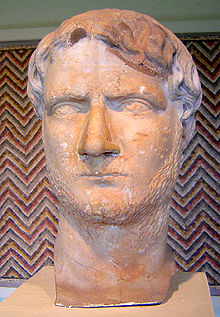Emperor Gallienus
| Gallienus | |||||
|---|---|---|---|---|---|

Bust of Gallienus
|
|||||
| 41st Emperor of the Roman Empire | |||||
| Reign | 253–260 with Valerian; 260 with Saloninus 260–268 alone |
||||
| Predecessor | Aemilianus | ||||
| Successor | Claudius II | ||||
| Born | c. 218 | ||||
| Died | 268 (aged 50) Mediolanum, Italy |
||||
| Wife | |||||
| Issue | Valerianus, Saloninus, Marinianus | ||||
|
|||||
| Father | Valerian | ||||
| Mother | Egnatia Mariniana | ||||
| Full name | |
|---|---|
| Publius Licinius Egnatius Gallienus (from birth to accession); Caesar Publius Licinius Egnatius Gallienus Augustus (as emperor) |
Gallienus (IPA:ˌgæliˈɛnəs; Latin: Publius Licinius Egnatius Gallienus Augustus; c. 218 – 268) was Roman Emperor with his father Valerian from 253 to 260 and alone from 260 to 268. He ruled during the Crisis of the Third Century that nearly caused the collapse of the empire. While he won a number of military victories, he was unable to prevent the secession of important provinces.
The exact birth date of Gallienus is unknown. The Greek chronicler John Malalas and the Epitome de Caesaribus report that he was about 50 years old at the time of his death, meaning he was born around 218. He was the son of emperor Valerian and Mariniana, who may have been of senatorial rank, possibly the daughter of Egnatius Victor Marinianus, and his brother was Valerianus Minor. Inscriptions on coins connect him with Falerii in Etruria, which may have been his birthplace; it has yielded many inscriptions relating to his mother's family, the Egnatii. Gallienus married Cornelia Salonina about ten years before his accession to the throne. She was the mother of three princes: Valerian II, who died in 258; Saloninus, who was named co-emperor but was murdered in 260 by the army of general Postumus; and Marinianus, who was killed in 268, shortly after his father was assassinated.
When Valerian was proclaimed Emperor on 22 October 253, he asked the Senate to ratify the elevation of Gallienus to Caesar and Augustus. He was also designated Consul Ordinarius for 254. As Marcus Aurelius and his adopted brother Lucius Verus had done a century earlier, Gallienus and his father divided the Empire. Valerian left for the East to stem the Persian threat, and Gallienus remained in Italy to repel the Germanic tribes on the Rhine and Danube. Division of the empire had become necessary due to its sheer size and the numerous threats it faced, and it facilitated negotiations with enemies who demanded to communicate directly with the emperor.
...
Wikipedia
